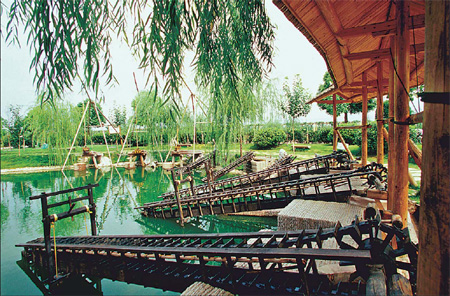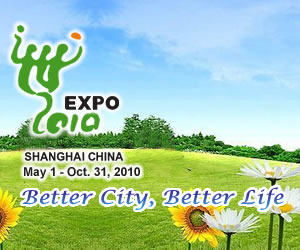Down on the farm in Tengtou
 |
|
Waterwheels are especially popular among visitors, which help them to get close to nature. provided to China Daily |
The "Best Village of China" is on display at the Expo 2010 Shanghai, but to get a satisfying taste of the bucolic life head to real thing, 230 kilometers away.
At Expo Garden, the village of Tengtou displays its "dreamland for living", but the real delights of Tengtou are 230 kilometers away from the Expo Garden. It is worth the visit to discover its rustic and environmentally friendly atmosphere.
Tengtou, near Ningbo city in Zhejiang province, is the only village to have an exhibit in the Urban Best Practices Area. The village has also been recognized by the United Nations as a World 500 Ecological Best and by China as Best Village of China.
Although deemed a "modern village", Tengtou's charm lies not in what others would expect in an advanced village. There are no massive machines for mass-agricultural production, but the village is not a nostalgic picture of old thatched houses and muddy roads either.
"Isn't it fascinating that a village can be so beautiful and so rich without becoming industrialized, like so many villages in China?" asked Li Xun, a 46-year-old visitor from Hunan province.
Tengtou's strategy of making tourism and environmental protection mutually beneficial is one of the unique draws of the village.
The village farmland makes the most of nature, human power and clean energy. Many of the agricultural and production practices are designed to make life easier but not in a way that harms the environment. Power is clean and recyclable, farming is advanced by the use of rotation strategies, cultural relics are well preserved and tourists help in the process of growing flowers, fruits and trees in the village.
A highlight for visitors to the National Agriculture Demonstrative Park in Tengtou village is the experience of seeing and taking part in rural production methods, such as spinning yarns, weaving cloth and milling and hulling rice. The merits of these century-old production methods are now valued again in a time when sustainable development is highly emphasized.
Waterwheels are especially popular among visitors, who love to get close to nature. Installed on a stream running across the village, several kinds of waterwheels help irrigate fields alongside the stream. It is not an easy job to get the wheel to run and requires cooperation of at least two people at the same pace, and some strength to keep the wheel turning.
Milling rice is not only an opportunity to see a traditional food processing but also a chance to make rice pudding. The slightly sweet desert with a lasting flavor of rice has been enjoyed in eastern China for thousands of years.
More modern agricultural technologies do not go unused, but they are unseen. To utilize the fertile soil, the modern idea of rotating planting and harvesting fruits and vegetables makes sure there is always fresh produce in the village. Bananas, roses, grapes, chrysanthemum pears, peaches - you name it, they grow it.
With more than 100 different vendors in the village sell fruits, vegetables and flowers, visitors have access to the freshest crops. Visitors who wish to bring a piece of the idyllic life home can also choose from a variety of bonsai trees.
Summer is an especially good time to visit Tengtou village, when peaches and watermelons are fresh and ripe. It is said that the peaches in Tengtou are so juicy that you can simply pierce the peach with a straw and drink until only the skin and stone remain.
Organic watermelon will cool off even the hottest summer heat and is also a must-try.
And those looking for a little entertainment need look no further than the locals. In the pavilion next to field, Tengtou residents perform their favorite acts of Yueju opera, second in popularity in China only to Peking opera, as a part of their daily entertainment.
Anyone who is a fan of Chinese traditional art will also enjoy the well-preserved stone windows, furniture and local relics that date back to Ming Dynasty.
"This is a place that both our ancestors and we envy," said Howard Yamazaki, a Japanese tourist who has visited the village four times.
The nearly 100 households in Tengtou are prepared to host tourists from all over the world. Homestays in Tengtou village promise a cheerful morning waking up to singing birds.
"I've learned from the practices here that perhaps we are going too fast," Yamazaki said. "If we slow down a little bit or return to old practices a little bit, we'll explore better ways for life."
 0
0 








Go to Forum >>0 Comments